|
|
|
Sort Order |
|
|
|
Items / Page
|
|
|
|
|
|
|
| Srl | Item |
| 1 |
ID:
178207
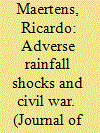

|
|
|
|
|
| Summary/Abstract |
News reports and policymakers frequently link African civil conflicts and wars to agricultural crises caused by droughts. However, empirical studies of the relationship between rainfall and civil conflict or war remain inconclusive. I reexamine this relationship focusing on rainfall over each country’s agricultural land during the growing seasons. I also incorporate that the relationship between rainfall and agricultural output is hump-shaped, as rainfall beyond a threshold decreases output. I find a U-shaped relationship between rainfall and the risk of civil conflict and war in (Sub-Saharan) African countries. This relationship mirrors the hump-shaped relationship between rainfall and agricultural output.
|
|
|
|
|
|
|
|
|
|
|
|
|
|
|
|
| 2 |
ID:
114581
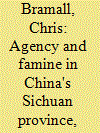

|
|
|
|
|
| Publication |
2011.
|
| Summary/Abstract |
A revisionist literature on the Great Chinese Famine has emerged in recent years. These revisionists focus primarily on the question of agency. They claim that that neither poor weather nor the excesses of local cadres can explain the extent of mortality; rather, responsibility lies squarely with Mao and the CCP leadership. Using county-level data on mortality, output, rainfall and temperature for Sichuan province, I argue that this revisionist view is unconvincing. Weather admittedly played only a minor role, and the zealotry of the Party centre contributed significantly to the death toll. However, variations in mortality between Sichuan's counties appear to have been essentially random - suggesting that differences in local cadre responses to central government policy were decisive in determining the scale of famine.
|
|
|
|
|
|
|
|
|
|
|
|
|
|
|
|
| 3 |
ID:
138234
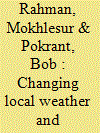

|
|
|
|
|
| Summary/Abstract |
Coastal Bangladesh is experiencing the effects of weather and climate-related stressors. The paper reports on the ways in which members of nine occupational groups in two coastal villages in South-west Bangladesh understand and respond differentially to recent changes in local weather and weather-related events and processes. Their understanding is grounded in local experiences and varied livelihood options, which are a complex interaction between people’s social and spatial locations and local weather and non-weather events and processes. Their priorities are to protect livelihoods through resilience-building actions, which address proximate causes of vulnerability (improving coastal embankments, rehabilitating and strengthening homesteads, protecting agricultural land). Government support is limited to traditional development interventions that assist some more than others and often disconnected from local people’s priorities. Most adaptation actions are practical measures within the prevailing politico-legal order. There is some evidence of more rights-based cooperative action between a national non-governmental organisation and local farmers that challenged aspects of that order.
|
|
|
|
|
|
|
|
|
|
|
|
|
|
|
|
| 4 |
ID:
092555
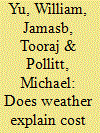

|
|
|
|
|
| Publication |
2009.
|
| Summary/Abstract |
In recent years, a number of empirical studies and energy regulators have applied benchmarking techniques to measuring the efficiency and performance of network utilities. An important issue has been the extent to which the results are influenced by contextual factors. Among these, weather factors are frequently discussed as being important. We use factor analysis and two-stage data envelopment analysis techniques to examine the effect of a set of important weather factors (gale, hail, temperatures, rainfall and thunder) on the performance of electricity distribution networks in the UK. The results indicate that such factors often do not have a significant economic and statistical effect on the overall performance of the utilities. The weather parameters in some models are significant in terms of economic efficiency. The results echo our previous findings of the importance of extending the basic model to include other inputs such as total expenditure (Totex), customer minutes lost (CML) and network energy losses in regulatory benchmarking.
|
|
|
|
|
|
|
|
|
|
|
|
|
|
|
|
| 5 |
ID:
101764
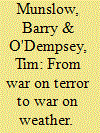

|
|
|
|
|
| Publication |
2010.
|
| Summary/Abstract |
This special issue of Third World Quarterly makes a case for redirecting attention and resources away from the 'war on terror' and focussing as a matter of urgency on the causes and consequences of global climate change. Global climate change must be recognised as an issue of national and international security. Increased competition for scarce resources and migration are key factors in the propagation of many of today's chronic complex humanitarian emergencies. The relentless growth of megacities in natural disaster hotspots places unprecedented numbers of vulnerable people at risk of disease and death. The Earth's fragile ecosystem has reached a critical tipping point. Today's most urgent need is for a collective endeavour on the part of the international community to redirect resources, enterprise and creativity away from the war on terror and to earnestly redeploy these in seeking solutions to the far greater and increasingly imminent threats that confront us as a consequence of global climate change.
|
|
|
|
|
|
|
|
|
|
|
|
|
|
|
|
| 6 |
ID:
186454
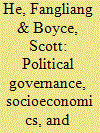

|
|
|
|
|
| Summary/Abstract |
Quantifying the effects of political, socioeconomic, and weather factors on greenhouse gas (GHG) emissions is vital for successful climate change mitigation and adaptation. We modeled these effects on provincial per-capita GHG emissions across Canada from 1990 to 2019. The results showed the percentage of variation in GHG emissions explained by the models ranged from 75.3% to 98.8% across the ten Canadian provinces. Socioeconomics was associated with most of the emission variation (46.1%), followed by weather (1.4%). The effect of political governance on GHG emissions was minor (0.7%) and inconsistent but had a strong interaction with socioeconomic factors. Energy use efficiency was identified to be the most influential factor, contributing to lowering emissions in eight provinces. We conclude that socioeconomic factors are most important in causing GHG emissions across Canada, while the importance of political governance is trivial, much to the chagrin of those making election promises. Investment in energy efficient technologies should have the highest return in reducing emissions.
|
|
|
|
|
|
|
|
|
|
|
|
|
|
|
|
| 7 |
ID:
183056
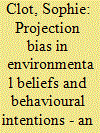

|
|
|
|
|
| Summary/Abstract |
The projection bias corresponds to the human tendency to project current preferences into the future as if present preferences will remain unchanged, omitting a range of external influences over the current preferences. We design a survey experiment to investigate the projection bias relevance on two environmentally friendly initiatives, namely solar panels and eco-friendly transport. We found that beliefs and behavioral intentions are subject to positive change when individuals are solicited a day when the weather is congruent with the proposed changes. We draw several policy and managerial implications for environmental issues.
|
|
|
|
|
|
|
|
|
|
|
|
|
|
|
|
| 8 |
ID:
129997
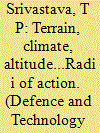

|
|
|
| 9 |
ID:
180645
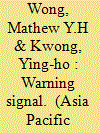

|
|
|
|
|
| Summary/Abstract |
This article examines the discourse of ‘Li's Field’ in Hong Kong, named after tycoon Li Ka-shing and used to satirically denounce the government-business political nexus. The discourse challenges the apparent reluctance of the weather agency to decide that a typhoon is strong enough to warrant a city-wide suspension of business activities, which would obviously be detrimental to capitalist interests. In comparison to the earlier period characterised by political trust, institutional and political factors in recent decades have intensified the impression of government-business collusion and the erosion of political trust. Li's Field is a case illustrating how political distrust can spill over into bureaucracy, challenging the traditions of bureaucratic neutrality and meritocratic and scientific policymaking. This article provides an analysis of the ‘field’ with primary interview data, media discourse analysis and secondary data. This study contributes by exploring political trust in politicians and bureaucrats, and how the former spills over into the latter.
|
|
|
|
|
|
|
|
|
|
|
|
|
|
|
|
| 10 |
ID:
056563
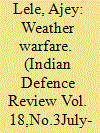

|
|
|
| 11 |
ID:
131660
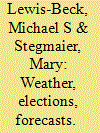

|
|
|
| 12 |
ID:
084569
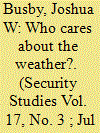

|
|
|
|
|
| Publication |
2008.
|
| Summary/Abstract |
Is climate change a national security threat to the United States? This question remains a subject of debate in academia and has received renewed emphasis in the policy community. Even taking a narrow definition of national security, climate change already constitutes a national security threat to the United States, both in terms of direct threats to the country as well as its broader extraterritorial interests. While some of these purported threats-abrupt climate change and sea-level rise-have been overstated by advocates, several concerns, mostly related to the effects of extreme weather events on the United States and its strategic interests overseas, are sufficient enough that they already constitute security threats. That climate change potentially poses a direct threat to the U.S. homeland and its overseas interests suggests the subject warrants serious attention.
|
|
|
|
|
|
|
|
|
|
|
|
|
|
|
|
|
|
|
|
|